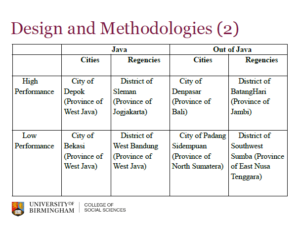On 16 August 2018, Kementerian Perencanaan Pembangunan Nasional/Badan Perencanaan Pembangunan Nasional (BAPPENAS) hosted the FKP Seminar in Jakarta on the topic of government service. Mohammad Roudo (BAPPENAS) presented his study on this topic which aimed to assess the influence of an assigned standard on public service on the motivation of public agencies to improve their performance.
Minimum Service Standard (MSS) in Indonesia was defined as a tool to improve service quality in response to unequal coverage problem, specifically in health and primary education services. However, this instrument may also lead to inferior performance, i.e. the so-called unambitious average (target) syndrome, defined as a unit that prefers to remain in the middle (average) of the target. Units that choose to stay at mediocre average level tends to do so in order to avoid inspection and supervision from auditors, inspectors, or higher authorities.
Using multiple and parallel case studies design, the researcher conducted semi-structured interviews with 80 individuals including government staff, scholars, academicians, and international experts. He then chose high and low performing regions in Java and non-Java. From the classification, the hypotheses was whether MSS was seen as important/significant/relevant tools for the sample’s region. He classified the hypotheses based on the current region’s achievement in public service performance.
Overall, the researcher found various responses from different regions about the implementation of MSS. Those who perceived MSS as important, significant, or relevant influence are local government staff with slightly below or close to the current MSS targets. On the other hand, MSS was seen as less important, significant, or relevant by government staff whose current achievement are either higher than the standard or very well below the standard.
The study found that the influence of MSS on the motivation of local government staff to deliver services di not fit the notion of unambitious average (target) syndrome. The low performance of government agencies given the current standard, was likely to be caused by low capability rather than unambitious average (target) syndrome. Further, a different minimum service standard seems to be needed for high-achieving regions.
For the complete presentation and Q&A session, please refer to the videos and materials provided.






